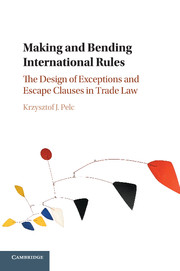Book contents
- Frontmatter
- Dedication
- Contents
- List of Tables
- Acknowledgments
- 1 The “Architectural Challenge” of International Rules
- 2 A Theory of the Design of Flexibility
- 3 A Brief Intellectual History of Flexibility in Law
- 4 The Twin GATT Exceptions: Fears and Solutions
- 5 The Evolving Design of Flexibility
- 6 The Bad News
- 7 The Good News
- 8 The Great Recession and Beyond
- Bibliography
- Index
6 - The Bad News
Published online by Cambridge University Press: 05 September 2016
- Frontmatter
- Dedication
- Contents
- List of Tables
- Acknowledgments
- 1 The “Architectural Challenge” of International Rules
- 2 A Theory of the Design of Flexibility
- 3 A Brief Intellectual History of Flexibility in Law
- 4 The Twin GATT Exceptions: Fears and Solutions
- 5 The Evolving Design of Flexibility
- 6 The Bad News
- 7 The Good News
- 8 The Great Recession and Beyond
- Bibliography
- Index
Summary
It may be the duty of social scientists to start with the bad news – I do so here, but then endeavor to show the brighter side of things in the following chapter. Indeed, there would be no reason to speak of an architectural challenge in the design of flexibility provisions, were it not for the fear that the inclusion of flexibility mechanisms may do more harm than good to a treaty. This chapter shows that such fears are not unfounded. If flexibility is over-provided, it can water down the agreement, diminishing the gains from trade that it would otherwise produce. This watering down of countries’ commitments may be most likely following ambitious bouts of liberalization. More subtly, the sheer existence of flexibility, quite independently from its use, can inject considerable uncertainty into the trade regime, the impact of which can be assessed empirically. In short, the availability of unconstrained flexibility acts as a tax on trade.
DOES FLEXIBILITY FUEL THE LAW OF CONSTANT PROTECTION?
Flexibility provisions are designed to deal with situations where the political costs of compliance grow unmanageable. If their use is limited to such exigencies, then flexibility works as intended by the designers of the agreement. One concern, however, is that political costs of compliance may arise as a result of states’ commitments themselves: policymakers would then be turning to flexibility measures to roll back the liberalization they have committed to in the first place. In the early 1980s, Ray and Marvel (1984) urged that the ambitious trade liberalization that was the outcome of the GATT's Kennedy Round be measured against the increase in non-tariff barriers that could be observed at the time. This pattern – whereby policymakers make multilateral commitments in exchange of reciprocal concessions, but then find alternative means of offering import relief to their domestic producers to ease the cost of adjustment – is what Bhagwati (1989) referred to as the Law of Constant Protection: “if you reduce one kind of protection, another variety simply pops up elsewhere” (53). Interestingly, Bhagwati himself, having coined the term, judged his own proposition as empirically “implausible.” This seems to have been because he was taking a long view, looking at aggregate global liberalization in the second half of the twentieth century.
- Type
- Chapter
- Information
- Making and Bending International RulesThe Design of Exceptions and Escape Clauses in Trade Law, pp. 206 - 233Publisher: Cambridge University PressPrint publication year: 2016



